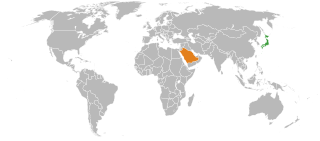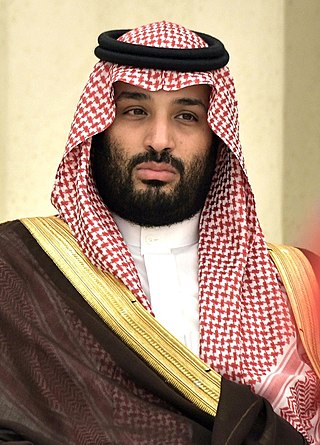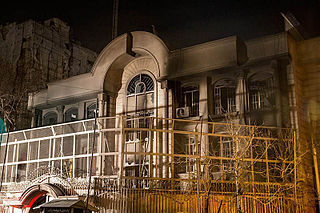 | |
Australia | Saudi Arabia |
|---|---|
Bilateral relations exist between Australia and Saudi Arabia. Australia has an embassy in Riyadh and a consulate in Jeddah; and Saudi Arabia has an embassy in Canberra and a consulate in Sydney.
 | |
Australia | Saudi Arabia |
|---|---|
Bilateral relations exist between Australia and Saudi Arabia. Australia has an embassy in Riyadh and a consulate in Jeddah; and Saudi Arabia has an embassy in Canberra and a consulate in Sydney.
Australia and Saudi Arabia established relations following the end of World War II. The two countries are members of G20. [1]
Saudi Arabia and Australia were part of the joint-alliance with the United States during the Cold War, as both were strongly anti-communist and hostile to the Soviet Union. [2] Once the Cold War came to an end, Saudi Arabia and Australia increased their cooperation.
Saudi Arabia, along with the United Arab Emirates, is Australia's major market partner in the Middle East. [3]
With Saudi Arabia announced Saudi Vision 2030, Australia was viewed highly for its contribution to the vision development. [4]
In 2016, it was reported that Saudi embassy staff in Canberra overspeed and do not pay their fines. [5]
In 2018, after Jamal Khashoggi was assassinated, the Australian government condemned the Saudi authorities and stated that Australian diplomats would not be attending an international event later that year. [6]
During the 2018 FIFA World Cup qualification – AFC Third Round, Australia faced up Saudi Arabia in an important game over 2018 FIFA World Cup in Adelaide. The match happened after the deadly Manchester Arena bombing killing 23 people and two sides were informed to make one-minute silence; however the Saudi team, instead of observing one minute, disrespected the local populace by taking on the ground. [7] This has caused uproar that Saudis did not demonstrate respect for the population and that Saudis did not respect the deaths despite Saudi explanation that it wasn't part of Saudi culture, given how they already observed silence for the Qatar Airways Cup match between Al-Ahli Saudi FC and FC Barcelona a year earlier. [8] The Saudi officials later apologized for the misdeed and claimed to correct the mistakes. [9] Australia won the game 3–2 but only managed to qualify for World Cup throughout playoffs while Saudi Arabia managed to become one of four Asian teams to qualify first.
In 2021, the two-way goods and services trade totalled $2.93 billion. Saudi Arabia is a substantial market for beef, sheep meat, barley, wheat, dairy products, cosmetics, pharmaceuticals, vehicle parts and accessories and vegetables. [1]
A large number of Saudi tertiary students study in Australia, mostly under the King Salman Scholarship Program. In 2019, there were more than 6,200 Saudi students studying in Australian educational institutions, representing the largest cohort from the Middle East region. [1]
At the time of the 2016 Australian census, there were over 12,000 Saudi Arabians living in Australia. [10]
Saudi Arabians living in Australia tend to have a higher median income compared to other migrant populations and the average Australian-born population. They are predominantly young (majority being under the age of 30). [10]
According to a 2020 poll by the Lowy Institute, Saudi Arabia is the most negatively perceived country by Australians, scoring only a 32% positivity rating. [11]

Foreign relations of Saudi Arabia are the diplomatic and trade relations between Saudi Arabia and other countries around the world. The foreign policy of Saudi Arabia is focused on co-operation with the oil-exporting Gulf States, the unity of the Arab world, Islamic solidarity, and support for the United Nations. In practice, the main concerns in recent years have been relations with the US, the Saudi Arabian–led intervention in Yemen, the Israeli–Palestinian conflict, Iraq, the perceived threat from the Islamic Republic of Iran, and the effect of oil pricing. Saudi Arabia contributes large amounts of development aid to Muslim countries. From 1986 to 2006, the country donated £49 billion in aid.

Adel Al-Jubeir is a Saudi diplomat who is the former Saudi Minister of Foreign Affairs and the current Saudi Minister of State for Foreign Affairs. He is the second person not belonging to the House of Saud to hold the office, after Ibrahim bin Abdullah Al Suwaiyel. He previously served as the Saudi Ambassador to the United States from 2007 to 2015, and was also a foreign policy advisor to King Abdullah.

Jamal Ahmad Khashoggi was a Saudi journalist, dissident, author, columnist for Middle East Eye and The Washington Post, and a general manager and editor-in-chief of Al-Arab News Channel who was assassinated at the Saudi consulate in Istanbul on 2 October 2018 by agents of the Saudi government, allegedly at the behest of Crown Prince Mohammed bin Salman. He also served as editor for the Saudi Arabian newspaper Al Watan, turning it into a platform for Saudi progressives. Khashoggi fled Saudi Arabia in September 2017 and went into self-imposed exile. He said that the Saudi government had "banned him from Twitter", and he later wrote newspaper articles critical of the Saudi government. Khashoggi had been sharply critical of the Saudi rulers, King Salman and Crown Prince Mohammed bin Salman. He also opposed the Saudi Arabian-led intervention in Yemen.

Bilateral relations between Saudi Arabia and the United States began in 1933 when full diplomatic relations were established and became formalized in the 1951 Mutual Defense Assistance Agreement. Despite the differences between the two countries—an Islamic absolute monarchy, and a secular constitutional republic—the two countries have been allies ever since. The core logic underpinning the relationship is that the United States of America (USA) provides military protection of the Kingdom in exchange for a reliable oil supply from the Saudis, pricing of oil in USA dollars, and Saudi support for American foreign policy operations across the world. Ever since the modern relationship began in 1945, the U.S. has been willing to overlook some of the kingdom's more unusual aspects such as Wahhabism, its human rights and alleged state-sponsored terrorism as long as it maintained oil production and supported USA national security policies.
Multiple forms of media including books, newspapers, magazines, films, television, and content published on the Internet are censored in Saudi Arabia.

Saudi Arabia and Turkey relations have long fluctuated between cooperation and alliance to enmity and distrust. Since the 19th century, the two nations have always had a complicated relationship. While Turkey and Saudi Arabia are major economic partners, the two have a tense political relationship, deemed from the historic enmity.

Japan–Saudi Arabia relations are the foreign relations between Saudi Arabia and Japan. Official relations between the two nations were established in 1955.

According to the British government, the United Kingdom of Great Britain and Northern Ireland and the Kingdom of Saudi Arabia have long been close allies. Relations between the two countries date back to 1848, when Faisal bin Turki, ruler of the Second Saudi state, formally requested the support of the British Political Resident in Bushire for his representative in Trucial Oman.

Bilateral ties exist between Australia and the United Arab Emirates. The UAE maintains an embassy in Canberra whilst Australia has an embassy in Abu Dhabi and a consulate-general in Dubai.

Saudi Arabia – United Arab Emirates relations refers to the current and historical relationship between Saudi Arabia and the United Arab Emirates. Saudi Arabia maintains an embassy in Abu Dhabi and a consulate in Dubai while the U.A.E. has an embassy in Riyadh and consulate in Jeddah. Both countries are neighbours and as part of the Middle East and Persian Gulf region, share extensive political and cultural ties.

Israel–Saudi Arabia relations refer to the bilateral ties between the State of Israel and the Kingdom of Saudi Arabia. The two countries have never established diplomatic relations; in 1947, Saudi Arabia voted against the United Nations Partition Plan for Palestine, which aimed to split the territory of British Palestine into an Arab state and a Jewish state. As part of the Arab–Israeli conflict, Saudi Arabia has not recognized Israel since the latter's independence in 1948. Traditionally, the official Saudi policy towards the Israeli–Palestinian conflict has been supportive of the Palestinian Arabs and against Israel. However, reports have surfaced in recent years indicating extensive behind-the-scenes cooperation in the areas of diplomacy, intelligence, and security. Warming relations between the two sides are a direct result of the Arab–Israeli alliance, which came to fruition in light of the Iran–Israel proxy conflict and the Iran–Saudi Arabia proxy conflict, though it remains unofficial in nature. At the same time, the Saudi relationship with the Palestinian National Authority has been deteriorating.

Mohammed bin Salman Al Saud, colloquially known by his initials MBS or MbS, is Crown Prince and Prime Minister of Saudi Arabia. He also serves as the chairman of the Council of Economic and Development Affairs and chairman of the Council of Political and Security Affairs. He is considered the de facto ruler of Saudi Arabia, being deemed as such even before his appointment as prime minister in 2022. He served as minister of defense from 2015 to 2022. He is the seventh son of King Salman.

The 2016 attack on the Saudi diplomatic missions in Iran was a mob action on 2 January 2016 by protesters against the execution of a prominent Saudi Arabian Shi'a cleric. Mobs stormed the embassy in Tehran and the Saudi consulate in Mashhad and ransacked them. The embassy building was set on fire with Molotov cocktails and petrol bombs. During the attacks, the police arrived and dispersed protesters from the embassy premises and extinguished the fire.

Saudi Vision 2030 is a strategic framework to reduce Saudi Arabia's dependence on oil, diversify its economy, and develop public service sectors such as health, education, infrastructure, recreation, and tourism. Key goals include reinforcing economic and investment activities, increasing non-oil international trade, and promoting a softer and more secular image of the Kingdom. It also consists of increasing government spending on the military, as well as manufacturing equipment and ammunition.

Khalid bin Salman Al Saud, is a Saudi royal, diplomat, and politician who serves as the Saudi Arabian minister of defense. He was appointed defense minister on 27 September 2022. He is the tenth child and ninth son of King Salman.

Saudi Arabia–Tunisia relations refers to the bilateral relations between Saudi Arabia and Tunisia.

On 2 October 2018, Jamal Khashoggi, a Saudi dissident journalist was assassinated by agents of the Saudi government at the Saudi consulate in Istanbul, Turkey. Khashoggi was ambushed and strangled by a 15-member squad of Saudi assassins. His body was dismembered and disposed of. Khashoggi's final moments were captured in audio recordings, transcripts of which were subsequently made public.
The Tiger Squad, officially called the Rapid Intervention Force, is a de jure protective security unit under the Crown Prince of Saudi Arabia, Mohammed bin Salman. According to an unnamed source interviewed by the London-based online news outlet Middle East Eye following the assassination of Jamal Khashoggi in October 2018 and a BBC source inside Saudi Arabia who has a relative in the squad, it is a Saudi team that consists of approximately fifty Saudi officers.
The assassination of Jamal Khashoggi, a Saudi dissident, journalist for The Washington Post and former general manager and editor-in-chief of Al-Arab News Channel, occurred on 2 October 2018 at the Saudi consulate in Istanbul and was denounced by the majority of the international community.